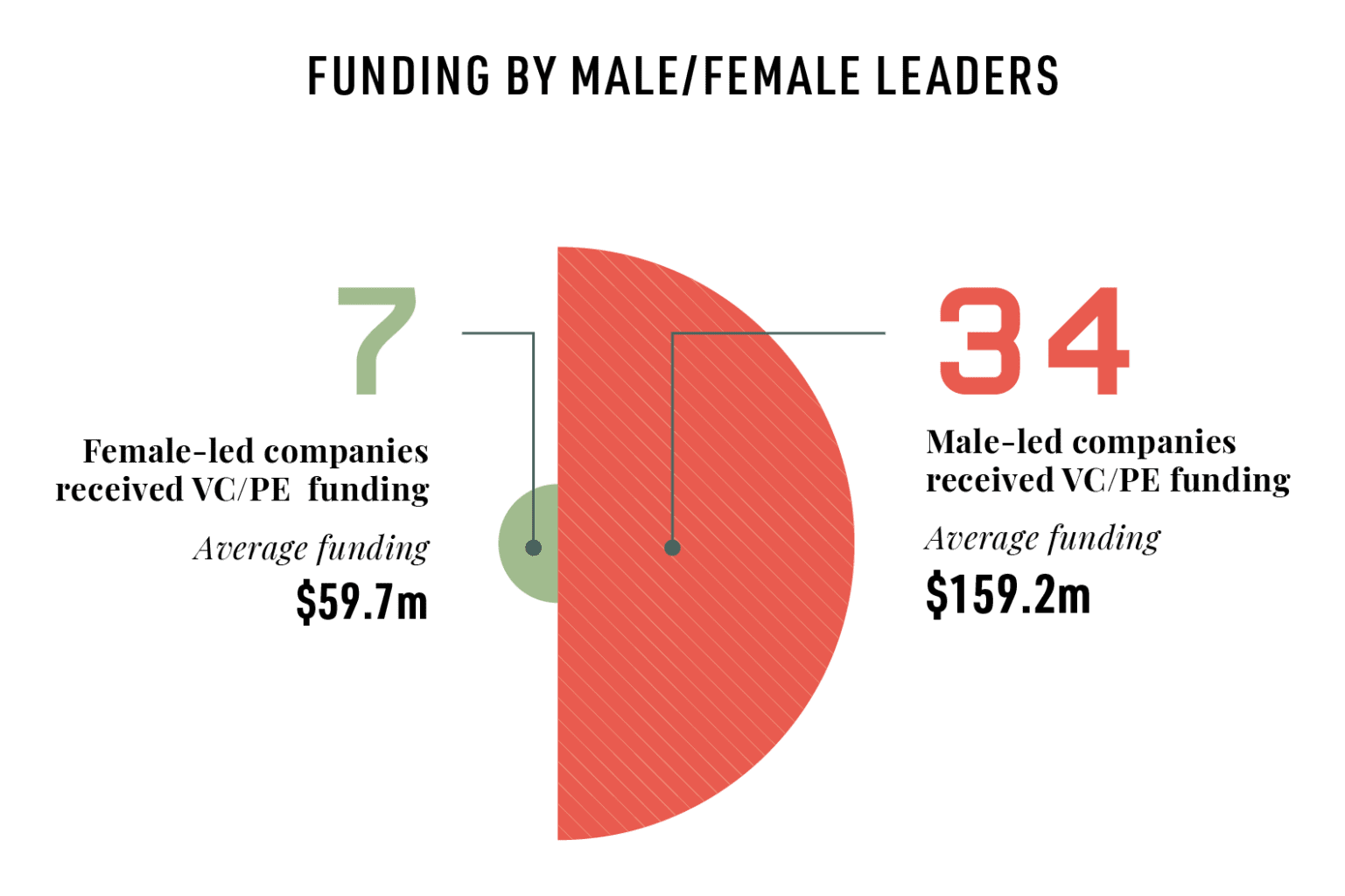New data has revealed a significant gender equity funding gap among the UK’s fastest growing companies. The research published in the Growth Index 2023, the annual ranking of the UK’s 100 fastest growing brands, male-led businesses received millions more in funding than female-led businesses.
Of the 41 companies in the 2023 Growth Index to secure VC/PE funding, only seven were headed by women. The data found that on average, female-led businesses achieved an average total funding value of $59.72m, with a sum total of $298.61m in funding – just 6.4% of overall funding.
This is nearly two thirds less than businesses with men at the helm, who secured an average funding value of $159.2m, with a total sum of $4,298m in funding.
Gender Equity Funding Gap UK

Now in its second year, the Growth Index is the definitive independent league table of the UK companies with the fastest growing sales, created to celebrate the companies that have supercharged growth and the leaders that have inspired and driven it. Companies are ranked by compound annual growth rate (CAGR) in sales over their last two financial accounting years (including filings up to February 2023). The ranking shines a spotlight on the most successful sectors and companies in the UK, championing good growth and the equitable democratisation of business opportunity in the UK.
READ MORE: UK Gender Investment Gap Means Women Miss Out On £599 Billion
Orlando Martins, founder of Growth Index and CEO of executive search consultancy ORESA, said: “Despite the proven track record of companies with women at the helm generating strong returns, there continues to be a lack of investment funding for female-led businesses.
“This not only represents a missed opportunity for investors, but also for society. We need to do more to level the gender funding gap and support female entrepreneurs by providing access to investment, mentorship, and other resources they need to succeed. By doing so, we can drive innovation, create jobs, and unlock the full potential of the economy.”
Growth Index 2023 does show companies led by women have fared poorly when it comes to the scale of VC/PE funding secured in comparison to those with male CEOs. Seven of the 12 companies in the GX with women at the helm, secured funding, but of just $59.72m, on average. Whereas the 35 companies with a man running the show that bagged funding (of the 88 in the GX) scooped an average $159.2m – more than double.
READ MORE: Investors In Tech Startups Still ‘Do Not Trust Female Founders’
Fifty-four-year-old, Marcia Kilgore, serial entrepreneur behind Bliss Spa, Soap & Glory and FitFlop, and CEO of the premium beauty company, Beauty Pie, which is sitting pretty at no. 39 in the Index, certainly doesn’t see gender as a barrier.
“My ambition is for Beauty Pie to be the most loved and trusted beauty brand in the world, no limits. I’m like Al Pacino [in Scent of a Woman], I’m just getting warmed up.” she said.
Impact X Capital‘s General Partner and CEO Eric Collins spoke to The Women’s Journal about why underrepresented entrepreneurs offer high-growth potential.
Just 0.24% of venture capital money goes to black founders and 0.02% goes to black female founders. Eric Collins is on a mission to change this. Collins runs Impact X Capital Partners, a venture capital firm that believes in financial returns as well as social change and backs entrepreneurs looking to improve society and the way we live.
Impact X, which was founded in 2018, invests in underrepresented entrepreneurs including people of colour and women who are based in the UK and Europe.
“This has been a trend for a long time. It’s not simply an issue related to demographics like race – it’s also related to gender. Less than 3% of venture capital money goes to female-led teams, despite women obviously making up around 50% of the population. The numbers are not getting any better because investment activity has naturally fallen since late 2021 with the economic uncertainty,” says Collins.
He says part of the problem is because most investors are sourcing deals from their networks. If you are a fund manager looking to invest in new companies, you are likely to rely on your network of people who went to school or university with you and possibly people with whom managers have worked. Therefore you are choosing from a very small pool and depending upon your personal outreach will not achieve much diversity.
When choosing which founders to back, Collins says Impact X follows some standard models and also breaks some rules. Impact X looks for the team’s track record. Ideally they will have started and run other successful companies in the past. If not, they should demonstrate they have played a key part in growing and scaling an organisation. Impact X wants to see demonstrated tenacity and the stewardship of resources.
Impact X also looks at how the founder has funded their company. Have they put themselves at risk and invested their own money? If not their own money, then how have they invested their time and network.

Areas with particular growth potential include health tech and artificial intelligence. Impact X likes people who are inventors of things we haven’t thought about before and who have the potential to encourage deep disruption. Sometimes that is a product disruption, a market disruption and or a business model disruption, i.e. better, faster, more sustainable.
“There are thousands of start-ups and about 1% will be appropriate for venture capital. And of that 1%, only a fraction are achieving the kinds of financial and social returns we’re looking for. The returns we target are 10x the money we put in within three to five years. So quite frankly, most organisations are never appropriate for venture capital. Those that are will demonstrate disruptive ideas and a growth execution plan,” says Collins.
One of Impact X’s biggest recent successes is Marshmallow, a London-based insurance technology firm that launched in 2016 and is valued at more than $1bn. The company was founded by twin brothers Oliver and Alexander Kent-Braham, and when it achieved unicorn status in 2021, Marshmallow was only the second UK start-up created by black founders to be valued at more than $1bn. Impact X invested in Marshmallow in late 2020, when the company was valued at $30m. In February 2023, Marshmallow was reported to be the second fastest growing company in Europe. Meanwhile the company has grown its workforce while maintaining 50% women and 20% people of colour.
Another investment is Raylo, a company that offers smartphone and other device leasing over two years instead of buying a handset outright. Their business model helps close the digital divide, allowing people to access the latest technology on an affordable monthly plan. In addition, customers receive a replacement phone at the end of two years. The older device is refurbished and sold therefore powering a circular economy.
“Investing in underrepresented entrepreneurs is the surest and quickest path for future UK success. We want to remain the leader in this space. We believe underrepresented people are the X-factor. They are used to not being highly funded. They are very tenacious – they don’t get discouraged when things don’t go right the first time. They are also very creative and are able to pivot,” says Collins.
“We believe that investing in companies and the way in which we deploy our capital is the best lever to actually create social change. Growth companies are the engine that allows for a lot of innovation and disruption. So publications like the Growth Index help publicise companies that may not otherwise be on people’s radars.”
This comes after new research revealed that investors in tech startups still ‘do not trust female founders’ and that women are missing out on a potential £599 billion in investment accounts, stocks and shares ISAs and private pensions in what has been dubbed the new gender investment gap.
The UK gender investment gap stands at almost £600 billion, with millions more male investors than female investors, and men holding far bigger investment portfolios and pensions.




